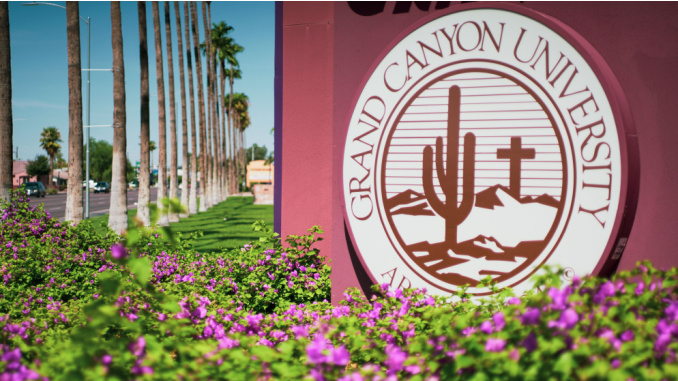By Corinne Murdock |
The Biden administration has set its sights on the largest private Christian university in the nation: Arizona’s Grand Canyon University (GCU).
For over half a decade the Department of Education (ED) has denied GCU’s IRS-granted nonprofit status. After GCU pushed back with legal action, the Biden administration responded with the full force of bureaucracy: a multi-agency attack to discredit and impose hefty fines on the university.
GCU President Brian Mueller told AZ Free News that ED’s rejection of a university’s IRS designation was new and unprecedented. Mueller maintained that ED offered “inapplicable criteria” for the denial.
The president couldn’t say with certainty whether the true cause of the ED targeting had to do with religious or political differences, but didn’t rule out the possibility.
“It’s obviously something other than the facts at hand,” said Mueller. “Is it because we have 30,000 graduates on an annual basis, where they’re studying from a Christian worldview?”
Although GCU is open about its Christian foundation and teachings, it doesn’t require its students to sign a statement of faith. Mueller estimated that 30 percent of incoming students don’t identify as Christians.
“We’re not a church, we’re a university,” said Mueller. “There’s free speech here. That’s one of the attractive things about us.”
GCU’s ethical positions do put it at odds with the federal government: GCU believes that God created the world and that truth comes from Him; that full personhood begins at the moment of conception and ceases at natural death; and that only the union between a man and a woman qualifies as a marriage.
“Resistance to the state is only appropriate when the state requires disobedience to the commands of God,” states GCU’s position on religious liberty. “Christian faith is a personal matter but the implications of faith in Christ should not and cannot remain private. Anyone who follows Christ in truth should strive to live in the way that Christ lived both in private and in public.”
In a public statement, GCU speculated that the targeting was due to ideological differences between their institution and the federal bureaucracy. GCU offers an education from a Christian worldview to its 30,000-odd graduates annually, though students aren’t required to sign a statement of faith. This year, the university brought in another 26,000 on-campus students and 92,000 online students.
“[W]e believe these agenda-driven actions are unprecedented against a regionally accredited 501(c)(3) designated nonprofit university and GCU categorically denies the claims being brought forth, which lack merit and illustrate extreme government overreach in what we believe is an attempt to harm a university to which individuals in these agencies are ideologically opposed,” said GCU.
ED has rejected GCU’s nonprofit status by the Internal Revenue Service (IRS) for over five years now. The IRS granted GCU its nonprofit status in July 2018; it took ED until November 2019 to deny the IRS classification, despite 26 other governmental, accrediting, and official entities accepting the nonprofit status including: the Arizona Corporation Commission, Arizona Private Postsecondary Board, Higher Learning Commission (HLC), and the NCAA.
ED maintains that since GCU’s majority revenues go to its former owner — Grand Canyon Education (GCE), a for-profit entity — that it doesn’t qualify as a nonprofit. GCU said that the revenues given to GCE were for education services at fair market value, as reported in investigations by two independent accounting and finance firms shared with the Biden administration.
GCU hasn’t raised its tuition in 15 years.
After GCU spent over a year attempting to resolve the ED denial, it sued the agency in February 2021. The timeline indicates that the lawsuit spurred a coordinated effort between ED, Federal Trade Commission (FTC), and Department of Veterans Affairs (VA) to target GCU. Several months later, ED launched a multi-year, off-site review of GCU.
Then, in October 2021, the FTC named GCU as one of 70 for-profit institutions on which it would exercise a decades-dormant punitive power: the Penalty Offense Authority (POA). The FTC alleged GCU, among others, to be a “bad actor” engaging in “unfair or deceptive” practices regarding “false promises” of graduate job and earning prospects. Each violation incurs civil penalties of up to about $50,000 (about $43,800 in 2021).
In that October 2021 announcement, the FTC declared their action was a “resurrection” of the POA, in which they would coordinate with ED and VA; the last time the FTC exercised the POA was in 1978.
Under the POA, the FTC may seek civil penalties if it can prove that its target was aware that certain conduct was unfair or deceptive, and that the FTC had previously issued a written decision on the conduct in question.
The three agencies began their investigations into GCU in 2022: the FTC in May, ED in June (regarding doctoral degrees), and VA in October.
One of FTC’s main accusations was that GCU had a disproportionate number of students who defaulted on federal student loans; GCU responded that its students have a lower loan default rate than the national average at nonprofit universities. FTC also accused Grand Canyon Education, GCU’s education services provider, with making inappropriate cold calls to prospective students. GCU maintained that GCE only reaches out to students who contacted them with interest first, never cold calls.
ED alleged that GCU conveyed substantial misrepresentation regarding its doctoral degree cost. In response, GCU cited the recent federal district and appellate rulings in Young v. GCU, which denied similar claims, and their last Higher Learning Commission (HLC) report declaring robust and transparent financial information practices.
“Their recruitment and marketing materials are clear and transparent, and financial information presented to students throughout the student lifecycle is robust,” said HLC. “The information and resources provided are robust and thorough, providing prospective students a clear picture of their academic and financial path toward a degree at GCU.”
GCU also cited its public calculator for the estimated costs for a 60-credit doctoral program and any potential continuation courses needed to complete a doctoral dissertation. ED requires universities to provide cost of attendance estimates for first year in college to first-year, first-time students, and only for undergraduate programs. GCU also reported that it goes beyond that, providing direct cost estimates for each year of the program of the study and for all its degree programs.
ED also disputed that an online student’s posting of a bio on the first day of class didn’t qualify as “academic-related activity.” GCU countered that ED’s Office of General Counsel told GCU in a 2012 written statement that such postings met that requirement, and that no accrediting bodies, nor ED, have questioned that practice previously, including ED’s last program review in 2014, which made no mention of the practice as problematic.
ED claimed that a 2011 rule change preempted the general counsel’s 2012 email to the university. It required GCU to review all student files from July 2014 to June 2021.
Under VA authority, the Arizona Veterans Services State Approving Agency (AZ SAA) told GCU that its advertising on cybersecurity demand was “erroneous, deceptive, or misleading.” Specifically, the AZ SAA took issue with describing cybersecurity experts as being “in high demand” and that all companies “need cybersecurity.”
GCU said that once it refuted the claim, AZ SAA accepted their refutations as true. GCU claimed that the AZ SAA was pressured by the VA to carry out a different type of audit in order to find fault with GCU’s advertising language regarding cybersecurity.
“It is our belief the SAA was unduly influenced by the U.S. Department of Veterans Affairs, in conjunction with other federal agencies, to conduct and carry out a risk-based audit in this manner rather than the audits it has performed in the past in which the University has received stellar reviews,” said GCU.
GCU says it has spent thousands of man hours and millions of dollars in legal fees to fulfill the Biden administration’s requests. It noted that these ongoing costs and potential fines threaten to upend its 15-year freeze on tuition — a major factor for its growth and, as a result, exposure of a Christian worldview-based education to more Americans.
“[B]ecause GCU, like almost all private universities, is dependent on tuition as a primary revenue stream and does not receive state funding like state universities, the university may be forced to raise tuition if the legal fees or fines associated with these actions continue to escalate,” stated the university. “We are, in essence, trying to protect our students from this government overreach.”
Corinne Murdock is a reporter for AZ Free News. Follow her latest on Twitter, or email tips to corinne@azfreenews.com.








